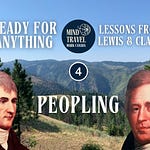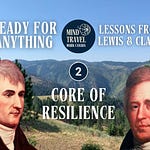Can fiction tell the truth?
Plenty of novelists would say it can. In fact, many would probably claim that fiction does a better job of telling the truth than, well, the truth itself does.
I took up the subject of this paradox in my first book, Literature and Journalism in Antebellum America (Palgrave Macmillan, 2011). There I focused on five writers from the mid-1800s — Henry David Thoreau, Emily Dickinson, Edgar Allan Poe, Harriet Beecher Stowe, and Rebecca Harding Davis — but I could have looked at some later writers, including Upton Sinclair, who wrote one of the best-known examples of what I call "investigative fiction." (For more on this genre, see my article on Rebecca Harding Davis in the March 29, 2025, issue of Mind Travel.)
In 1904, America's food industry was a kind of Wild West — the Wild Midwest, we might say when it came to meat processing, a major industry in Chicago. Meatpackers brought in thousands of heads of livestock and turned the animals into food for the country and the world.
The factories ran like a well-oiled machine. Railroads brought the live animals to the Union Stockyards, where laborers went to work slaughtering them, dismembering the carcasses, packing the meat, and starting the process of distributing it to distant locations.
If this machine was well-oiled, it was by no means carefully sanitized — more soiled and spoiled than oiled, in fact. The conditions in which the meat was processed and the condition (and ingredients) of this food would sicken most of us Americans today. Consider this description:
“There was never the least attention paid to what was cut up for sausage; there would come all the way back from Europe old sausage that had been rejected, and that was mouldy and white — it would be dosed with borax and glycerine, and dumped into hoppers, and made over again for home consumption. There would be meat that had tumbled out on the floor, in the dirt and sawdust, where the workers had tramped and spit uncounted billions of consumption germs. There would be meat sorted in great piles in rooms; and the water from leaky roofs would drip over it, and thousands of rats would race about on it. It was too dark in these storage places to see well, but a man could run his hand over these piles of meat and sweep off handfuls of the dried dung of rats. These rats were nuisances, and the packers would put poisoned bread out for them; they would die, and then rats, bread, and meat would go into the hoppers together.”
This description, as you may have guessed by now, comes from Sinclair's novel The Jungle, which first appeared in a newspaper in serialized form in 1905.
Although Sinclair was writing a novel — by definition a work of fiction — the many details of meatpacking, working conditions, and more came from extensive research he conducted in the packing plants and their environs in 1904.
His account made an impact. How could it not? The book was a sensation, drawing attention from thousands of Americans, including one who happened to be living in the White House.
President Theodore Roosevelt, like others, was disgusted by Sinclair's descriptions. In 1906, not long after The Jungle appeared, Congress passed (and Roosevelt signed) both the Meat Inspection Act and Pure Food and Drug Act.
Many writers would consider such a development a triumph, but cleaning up the food industry was not Sinclair's primary goal. "I aimed at the public's heart," he famously said, "and by accident I hit it in the stomach." When he wrote his novel, he actually devoted only a few paragraphs to the unsanitary conditions of meatpacking. The vast majority of the novel deals with the atrocious working and living conditions of laborers working in the packinghouses and living in the environs, as well as the pervasive political corruption of Chicago.
After publishing his novel, Sinclair referred to himself as a "muckraker," employing a term often used for traditional journalists such as Lincoln Steffens and Ida Tarbell, who had written exposés of politics and the oil industry. Unlike these authors, Sinclair was writing a novel. He invented a Lithuanian couple, Jurgis and Ona Rudkus, along with various family members, and inflicted them with disaster after disaster, typically tied to corruption, exploitation, or some other deplorable cause.
Sinclair did his research, spending seven weeks talking with workers and others in the vicinity of the Union Stockyards, and he could have written a traditional journalistic exposé, but he chose fiction to tell the truth. The decision does not appear so counterintuitive when we consider what fiction allowed Sinclair, as well as other writers, to do.
Next week, we will examine the specific reasons why fiction was an appropriate venue for Sinclair to use in his effort to tell the truth.












Share this post